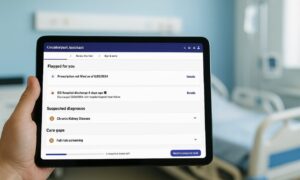Introduction
Navigating the complexities of ICD coding in urgent care revenue cycle management can be daunting for healthcare providers. The process has become more streamlined and efficient with the introduction of artificial intelligence (AI) technology, such as that offered by xpertdox.com. By utilizing AI algorithms, healthcare professionals can accurately assign the appropriate ICD codes to patient diagnoses, ensuring accurate billing and reimbursement. This advanced technology not only improves coding accuracy but also saves time and reduces errors, ultimately leading to increased revenue for urgent care facilities. With xpertdox.com’s cutting-edge AI solutions, healthcare providers can confidently navigate the intricate world of ICD coding quickly and precisely.
urgent care revenue cycle management
Effective urgent care revenue cycle management is essential for the financial health of a healthcare facility. Urgent care centers can maximize their revenue potential and minimize the risk of unpaid claims by efficiently managing the entire revenue cycle process, from patient registration to claim submission and payment collection. This includes verifying insurance coverage, accurately coding diagnoses and procedures, and submitting claims promptly. By implementing best practices and technology solutions, urgent care centers can streamline their revenue cycle processes and improve their cash flow. Investing in a comprehensive revenue cycle management strategy is crucial for ensuring an urgent care facility’s long-term success and sustainability.
Advantages and Limitations of AI ICD Coding
AI in ICD coding offers several advantages that can revolutionize healthcare systems. AI algorithms can process vast amounts of medical data quickly and accurately, leading to more efficient coding and billing processes. This saves time and reduces the chances of errors, ultimately improving patient care and streamlining administrative tasks for healthcare providers.
Additionally, AI-powered ICD coding systems have the potential to adapt and learn from new data continuously, staying up-to-date with changing medical codes and guidelines.
Despite these advantages, there are limitations to be considered when implementing ai icd coding. One primary concern is the potential for biases in the algorithm that could lead to inaccurate coding decisions. Also, the initial investment required to set up an AI system may be a barrier for some healthcare facilities.
Furthermore, ensuring data privacy and security while using AI technology poses a challenge, as sensitive patient information must always be protected. Finding a balance between these limitations and AI’s benefits in ICD coding will be essential for maximizing its potential in improving healthcare delivery.
Conclusion
Integrating AI technology in navigating the complexities of ICD coding has revolutionized revenue cycle management in urgent care facilities. By automating repetitive tasks and streamlining workflows, AI can significantly improve accuracy and efficiency in coding practices in medical field. This reduces the risk of errors and enhances revenue capture for healthcare providers. Moving forward, urgent care centers must embrace these advancements and leverage AI solutions to optimize their revenue cycle operations. Embracing AI in ICD coding is not just a trend but a strategic imperative for staying competitive in the evolving healthcare landscape. Start exploring AI solutions today to unlock the full potential of your urgent care revenue cycle management.



































